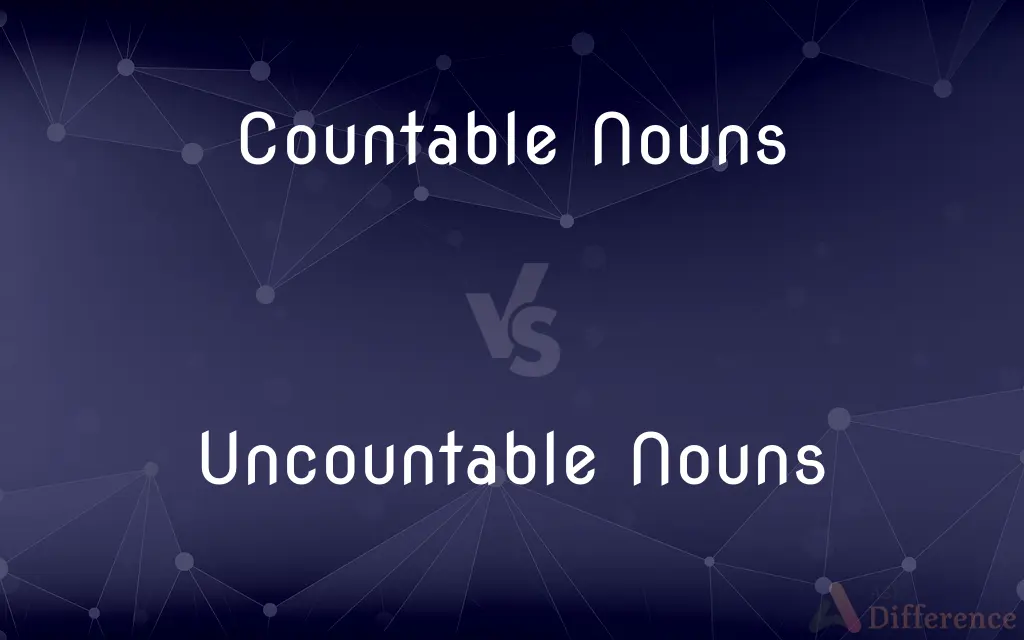Countable Nouns vs. Uncountable Nouns — What's the Difference?
Edited by Tayyaba Rehman — By Fiza Rafique — Published on December 29, 2023
Countable nouns are individual items we can count (e.g., apples, cars). Uncountable nouns refer to masses or abstract ideas that aren't counted (e.g., milk, love).

Difference Between Countable Nouns and Uncountable Nouns
Table of Contents
ADVERTISEMENT
Key Differences
Countable nouns represent objects, people, or ideas that can be counted individually. These nouns can have both singular and plural forms. For instance, a "book" can become "books", and a "cat" can turn into "cats".
Uncountable nouns, on the other hand, refer to things that cannot be counted individually because they're seen as a whole or mass. They don’t typically have a plural form in regular usage. For instance, we say "sugar" not "sugars" and "information" not "informations".
Countable nouns can often be used with numbers or quantifiers like "a few", "several", or "many". For example, you can have "three apples" or "several cars". They can also use the indefinite articles "a" or "an".
Uncountable nouns don’t usually work with numbers or the indefinite articles "a" or "an". Instead, they can be paired with quantifiers like "some", "a lot of", or "a little". For example, "some rice" or "a lot of patience".
Both countable nouns and uncountable nouns play crucial roles in sentence construction. While countable nouns refer to distinct entities, uncountable nouns represent more abstract concepts or collective masses.
ADVERTISEMENT
Comparison Chart
Plurality
Have singular and plural forms
Typically no plural form
Examples
Apples, dogs, books
Milk, sugar, information
Quantifiers
A few, several, many
Some, a lot of, a little
Indefinite Articles
Can use "a" or "an"
Don't use "a" or "an"
Countability
Individual items counted
Masses/ideas not individually counted
Compare with Definitions
Countable Nouns
Nouns that can take either singular or plural verbs.
The book is interesting but the books are expensive.
Uncountable Nouns
Nouns modified by quantifiers like "some" or "a lot of".
I have a lot of patience.
Countable Nouns
Nouns with distinct singular and plural forms.
The cat is playing with the dogs.
Uncountable Nouns
Nouns that typically lack a plural form.
She has a wealth of knowledge.
Countable Nouns
Nouns that can be paired with numerical values.
I bought three shirts.
Uncountable Nouns
Nouns referring to things seen as a whole, not counted individually.
I need some water.
Countable Nouns
Nouns that refer to individual items that can be counted.
There are four pens on the table.
Uncountable Nouns
Nouns not typically used with numerical values.
I got some information.
Countable Nouns
Nouns that can be modified by quantifiers like "many" or "few".
She has many friends.
Uncountable Nouns
Nouns that represent abstract concepts or masses.
Love is powerful.
Common Curiosities
What quantifiers can be used with countable nouns?
Quantifiers like "a few", "several", and "many" can be used with countable nouns.
What are countable nouns?
Countable nouns are items that can be counted individually, like apples or cars.
Can I say "two sugars"?
In certain contexts, yes, like when referring to two sugar cubes. However, as a mass, sugar is uncountable.
Can I use "a" or "an" with uncountable nouns?
No, uncountable nouns don't usually work with "a" or "an".
Are all liquids uncountable nouns?
Most liquids are uncountable, like water or milk, but there are exceptions when context changes, like "two coffees" meaning two cups of coffee.
Can countable nouns be singular and plural?
Yes, countable nouns can have both singular (e.g., "apple") and plural (e.g., "apples") forms.
Can a noun be both countable and uncountable?
Yes, depending on context. For example, "chocolate" can refer to the substance (uncountable) or individual pieces (countable).
How do I make uncountable nouns countable?
Use quantifiers or units of measure, e.g., "a glass of water" or "two loaves of bread".
Can I use "few" with uncountable nouns?
No, "few" is used with countable nouns. For uncountable nouns, use "a little".
Are countable nouns always tangible items?
No, while many are tangible, like "books", some can be intangible, like "ideas".
Can uncountable nouns have a plural form?
Typically, uncountable nouns don't have a plural form, e.g., "milk" not "milks".
What’s an example of an abstract uncountable noun?
"Happiness" is an abstract uncountable noun.
Can uncountable nouns take plural verbs?
Uncountable nouns typically take singular verbs, e.g., "The rice is cooking."
Do all countable nouns need an article in front?
No, articles are often used, but not always. It depends on the context and specificity.
Are animals countable or uncountable nouns?
Animals are typically countable, like "dog" or "cats".
Share Your Discovery

Previous Comparison
5’10 vs. 5’11
Next Comparison
Pocket Bully vs. American BullyAuthor Spotlight
Written by
Fiza RafiqueFiza Rafique is a skilled content writer at AskDifference.com, where she meticulously refines and enhances written pieces. Drawing from her vast editorial expertise, Fiza ensures clarity, accuracy, and precision in every article. Passionate about language, she continually seeks to elevate the quality of content for readers worldwide.
Edited by
Tayyaba RehmanTayyaba Rehman is a distinguished writer, currently serving as a primary contributor to askdifference.com. As a researcher in semantics and etymology, Tayyaba's passion for the complexity of languages and their distinctions has found a perfect home on the platform. Tayyaba delves into the intricacies of language, distinguishing between commonly confused words and phrases, thereby providing clarity for readers worldwide.












































